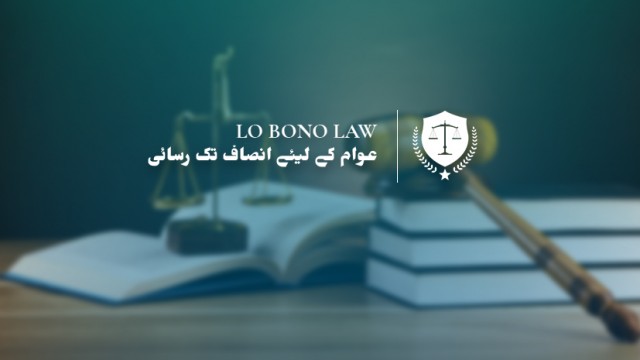Lo Bono Law Firm Initiative
Lo Bono Law (LBL) is a newly established law firm in Karachi which aims to provide cost effective quality legal services to clients. The aim of LBL is to provide legal services to all sorts of clients with a focus on less privileged individuals who cannot afford the high cost of litigation but require quality legal services.
LBL is committed to adopting a social enterprise model. LBL has clear payment criteria and charges clients on a sliding scale that evaluates the nature of the claim, the client’s income and the family members they have to support. Surplus revenue generated from services to more affluent clients is used to subsidize services for those who cannot afford them. LBL also connects clients to the Legal Aid Office for pro bono services and will donate surplus income to the Legal Aid Office to support the provision of legal aid to those who deserve it.
The idea of the firm came from the existing gaps in service delivery by the legal fraternity. The legal landscape in Pakistan is a daunting place for the average litigant. People who cannot afford the high cost of ethical, competent lawyers have to suffer through the katcheri culture and are often left helpless to unethical practices that are pervasive in Pakistan’s courts. Practices such as charging clients excessive court fees, charging clients for “incidental” costs for every hearing and hidden costs that are not disclosed in advance. Once a litigant has committed to a course of action it becomes impossible for them to withdraw without causing damage to their claim and this vulnerability is often exploited.
In order to help the disadvantaged and develop a mechanism to promote ethical lawyering, LBL adopts strict standards of full disclosure and charging a one-time fee. The model promotes dignity for each client and supports their participation throughout the complex process of attaining justice.
Even though LBL is a new idea and a new firm, it benefits from the experience of the LBL team. The firm comprises of two partners and four associate lawyers and has collective experience of over 30 years in the legal profession. The four associate lawyers have experience working for the Legal Aid Office and are known for their performance in court and sensitive client-handling. The team has established itself in the field of civil and criminal practice and all members have been enrolled as High Court Advocates of Pakistan.
LBL is headed by Ms. Aleena Zainab Alavi and Mr. Khilji Fahad Arif, who are both High Court enrolled Advocates. Ms. Alavi has a postgraduate degree from University of Warwick in International Development Law and Human Rights. She regularly represents clients in contentious matters before the High Courts and District Courts of Pakistan. Her main areas of practice include civil litigation, family law, international child abduction cases, forced marriages and cyber crime cases. Ms. Alavi was previously associated with ABS & Co. and its sister organization, the Research Society of International Law in Islamabad.
Mr. Fahad Khilji completed his Bachelors in Arts from National College Karachi and subsequently his law degree from Hamdard Law School in 2008 and has since then had the opportunity to work with some of the best law firms in Karachi. He has over 9 years of litigation experience which has build his expertise in the area of civil and criminal practice.
Lo Bono Law is particularly well-equipped to take on cases related to family law, domestic violence and violence against women, criminal defense, rent and contract cases and constitutional petitions. The firm is well suited to take clients referred by other institutional service providers and will be building linkages with non-governmental organizations (NGOs) and community-based organizations (CBOs) that provide non-legal and legal services to vulnerable groups. Moreover, LBL is committed to engaging in strategic or public interest litigation on needs basis to promote the provision and enforcement of human rights for the disempowered and vulnerable members of society.


